
#CoverStory: Feisty and fabulous Taapsee Pannu
The actor opens up to Cosmo India Editor Pratishtha Dobhal about how she finds ease in being herself and what sets her free.

Two things hit home when I met Taapsee Pannu. Unlike the strong characters she plays on screen, she has a charming disposition (making it pretty obvious she is a solid actor). However, the other more intriguing quality that stands out is her earnestness. Even in our conversation, she doesn’t steer away from dishing it out as she sees fit, keeping it very real, very honest, very Taapsee. For someone whose growing up years were ‘by the book’ template of being studious and rarely going out for fantastical cinematic escapades, Taapsee clearly revels in her journey of making it on her own. In an industry where fame and fortune often favours the ‘well connected’, she has a body of work that is rich with powerful stories, often opposite legendary actors. Inspiring, fascinating, fearless, and quite fabulous, Taapsee is truly living in her ‘Girl, you’ve got this’ era.
Pratishtha Dobhal (PD): It is evident with all of the years, which you’ve had in the industry and the kind of method you bring to your acting that you love a good challenge. What is a recent opportunity you’ve seen as a challenge you’ve wanted to win over?
Taapsee Pannu (TP): The one challenge that I felt was, or rather, has consistently been something that I succeed in or sometimes fail at is making sure I am not letting one part of my life overshadow the other. Sometimes (you know) your personal life demands more attention and your professional life takes a back seat; and at times it is the other way around. So the challenge has always been to make sure that I don’t give any one side of my life so much importance over the other that I do injustice to the other side...because I have a limited span of years to live. I don’t want to regret tomorrow that I didn’t give this [either professional or personal life] enough time and attention because then you start to overcompensate...and I don’t want to reach that stage.

PD: Did you have such clarity of thought right from the get-go or has it come over the past couple of years?
TP: It’s been 10 to 11 years now in the Hindi film industry for me, and 14 when I take into account my starting point, which was in the South. It is only in the last six or seven years that I started to feel I should concentrate on getting this balance right. I didn’t come from a mindset and a background of always wanting to be an actor, so my professional life was taking more of me because I was starting from scratch. I reached a point where I realised—after my fair share of failures and successes—that nothing is permanent, either the success or the failure.
But if I have to keep hustling constantly, I cannot just make that my life’s motto and forget the other aspects of my life thatare never coming back. I will never be able to fill the gap in my personal relationships, unlike my professional life. I didn’t want that kind of void in my personal life, which is something I realised in the last seven to eight years. You know, this is a never-ending hustle...no matter what stage you reach in your career, you’ll always have people who’ll be better than you and those who’ll not be where you are. This profession doesn’t give you the liberty to take it easy, so I kind of made peace with the fact that everybody is replaceable...everybody is going to come and go. I need to make sure that every 24-hours is worth living. That should be my goal rather than winning other endless accolades.
PD: Were you ever influenced by mentors or others you saw around who had the kind of work-life balance you wanted to emulate?
TP: I won’t say loneliness, but the fact that I was alone in this battle throughout, standing on my own, has been my mentor. I was alone in my journey and didn’t have a support system of any sorts in my work life. It taught me that you have to fend for yourself and stand up for yourself.
PD: You started off so young also...you were an engineer by profession...
TP: When I look at what’s happening right now, I feel like I started too old. Sometimes I feel why did I even bother to complete four years of engineering and then start?’ Look at the girls who are coming in today. They are teenagers...they start working on brands or films and prepping quite young. When I was their age, I was just trying to figure out which direction to walk in and I was pretty clueless. We’re only going by the book and leading monotonous lives by studying, passing exams, etc. In my early 20s, I
quickly realised I’ve made a lot of mistakes. Learning how to fix it on my own made me grow up pretty fast that I never ended up playing the college girl or those [similar] characters never came to me because I never had the liberty to choose or ask for those kinds of roles or scripts. When I look back and think why didn’t I do a rom-com, I realise that at that age and time, I was just trying to understand what amounts to good make-up, great hair, and styling. You know, these are the basics you learn in your early 20s when you start the job. I feel like I’ve been late at a lot of milestones in that sense.
PD: I feel differently...I feel that today’s generation, for instance, they grow up with the world capsule in a mobile in their hands. You can become content creators and, in turn, actors of sorts early on, so you have to give more credit to yourself for figuring this out all on your own as well.
TP: Yes, that is true. I acknowledge that I started late but there is not an ounce of regret because I am extremely happy with the fact that I completed my credible graduation degree with distinction. I did it happily and didn’t drag myself through it.

PD: Working in a South film—also a Telugu film—and learning a new language...did you feel out of depth?
TP: Totally! I felt like a fish out of water. I still remember that feeling in front of the camera when I had to overcome this sheep-in-a-big-city feeling. I remember the first shot I ever gave was in Tamil. I was given this one line, which was half in English, half in Tamil. I had never spoken Tamil in my life nor had heard it. I jumped in at the deep end and I remember, I said it [the dialogue] in such a stoic way that I was really taken aback by what was happening...but it was okayed in the first take. That’s because my director was so smart; he was like ‘I know where you’re coming from and what your frame of mind is, which is why I started off with this scene where I needed you to look like that’.
PD: Did you have any insecurities while growing up and were you the entertainer in your family? What was it like for a 15-year-old you?
TP: I actually don’t know if I knew what insecurities were at that point...I had a very normal childhood. I was neither the over-pampered one nor the neglected one. I was this typical elder sibling in the house and I had to fight through a lot of rules. I had the maximum responsibility to score and outscore my cousins and others because, you know, you’re always compared to everyone around you. I don’t know if that helped me push myself academically or I probably found my love for studying that I ended up scoring really well. So, it was never like I got a lot of stress from my parents about not doing well. As long as I scored well, my parents let me do whatever I wanted to do beyond studies.
PD: Like?
TP: Be it sports, public-speaking activities, dance, even street sports—these street games that we played as kids—I was allowed to do that. For instance, after the ninth standard, I probably was the only girl who continued playing Pithoo (the traditional Indian game of seven stones) in the society ground. After the ninth standard, all the girls were more keen on books or just meeting up with other girls, whereas I wanted to go out and burn all my energy. So, I ended up being the only girl among boys who would play and run around till the sun set.
PD: And did you have posters in your home of maybe, you know, girl bands, boy bands, or perhaps an iconic movie you were very affected by?
TP: My family has never been a ‘movie-loving’ one. They’ve never been the kinds who loved watching movies or taking us out to watch movies. Whatever movies I saw were during my lunch or dinner hours or whatever was playing on TV. While I used to watch satellite premieres of movies, it was only in my college days when I started going to theatres. My familiarity with the film industry didn’t really happen in those 15-16 years of age. But whatever I saw on TV caught my attention, and I would go back to it. I enjoyed watching Karisma Kapoor on screen. I remember, there used to be a time when I kept so many pictures of her with me.
PD: And now, looking back, if you could pack up your life in chapters in the decades you’ve lived so far, what name would you give to each decade, or how would you describe it and why?

TP: Hmm...the first decade will be the most hyperactive one. Being hyperactive has nothing to do with any syndrome; it is just that I’ve always been the overenergetic kinds who loved doing everything. I was never
shy of talking to strangers. It was a problem for my family...they’d think that, one day, I would go away with one of these strangers, which made me a very ‘hyper-social’ kid (laughs). The second decade was a confusing one because I was happy being a girl but I was not doing what a lot of girls around me did. It was like ‘why don’t I like sitting, chatting, and not playing?’ or ‘why am I not doing the conventional things that the girls of my age are doing?’.
That was followed by college, where there were mostly boys. I didn’t even care about what was stylish and what wasn’t. I used to be horribly dressed in baggy pants and loose shirts. For me, it was just like ‘this look is cool’. So my idea of cool did not resonate with the other girls of my age.Then came the 20-30 decade where you barely have figured out who you are, what you like, what you don’t like, and you’ve jumped from school to college. You’ve neither seen enough of life nor travelled enough to make a decision about what you want to do but you still have to choose your path. I feel that is a problem in our system.
PD: That is true...
TP: I was making these big life decisions when I really didn’t know much—neither about myself, nor about what life was in general at the time. That’s a decade where I was trying to find direction, plus, everybody scares you so much at that time that if it doesn’t go right, you’re going to lose out on a lot of years and time. I was working in the South in my 20s, when things were not really going in my favour and I was thinking ‘should I pick up the call and speak to my family that this is not really working out? I’m not enjoying a lot of these things that I’m doing here because my heart and mind are not able to...they’re not in sync’. But I was so scared because I was like I took the decision of choosing this profession and now, if I go back, will I be made to feel embarrassed in society? It’s in my 30s when I feel I have really come into my element—I feel like ‘okay, now I’ve kind of understood my life and myself well...Now I can make clear decisions and not be influenced by other people or what they tell me to do’. All this self-realisation started coming to me in my 30s.
PD: Fair to say you found ease in being yourself in your 30s? Which also leads me to your Insta bio that says: “I’m an acquired taste, not everyone’s cup of tea”...If you were to compare yourself to a cuisine or a dish, what is that acquired taste that ‘Taapsee’ is?
TP: It’s Sushi! While it might look bland and raw for your palette initially, there’s a process to get it to what it looks and tastes like...it’s just that it is not obviously visible to your eyes. And the method that has gone into making it.

PD: Speaking of chapters and self-evolution, congratulations are in order for your wedding this year to Mathias [badminton player, Mathias Boe]. You’ve spoken of how you met. But tell me, what’s that one thing, which really appealed to you about him as you got to know him better over the years?
TP: I think the fact that he is an athlete and someone who had won at the Olympics for a start...half the job was done there (laughs). I have always been very impressed and in awe of athletes who play for their country and play under extreme pressure without getting affected. I have loads and loads of respect and admiration for them. There was a lot of testing and a lot of me being sure. It was not like a love-at-first-sight situation, for me at least—I took time to test if it’s really practical...the feasibility of the relationship was important for me. I was obviously fond of him and respected him, and we kept meeting and I grew to love him. So falling in love didn’t happen in a month or instantly. It is a fact though, which I keep repeating in most interviews about him—when I met him I felt like I met a man. I had dated so many boys before him, and suddenly, I met a guy who didn’t feel like anyone I’d been with before. So there’s this sudden sense of security and maturity, which was so evident that I felt like ‘okay, you’ve finally found the man’.
PD: Culturally speaking, you also come from two different backgrounds. What are the similarities and differences you’ve discovered over this period of being together?
TP: How close-knit you’re as a family is something that’s similar between Scandinavians and us, I feel. And what is different culturally is how amazingly independent kids are over there. I have so many nieces and nephews and I see how wholesome and complete their personalities are. I can see them being confident at such a young age. They become independent early on and in life that sense of responsibility is so nicely transferred without feeling the pressure to perform, which is very different.
PD: Tell me...what sets you free in an action-oriented, wilful way
TP: I think that happens when I travel because that’s genuinely when I don’t have to bother about who’s looking, who’s filming, who’s watching, what is this going to be interpreted as. It is quite freeing when I take the trams, buses, tubes, trains in different countries, and travel locally without bothering about how this is going to be interpreted or who’s going to see and say what. So that kind of control over my being is what makes me feel free.
PD: And what’s the wildest spontaneous trip you’ve taken yet?
TP: (laughs) A lot of them have been spontaneous, but courtesy our visa department, not everything can be that spontaneous. But I think the recent one—when I went to Amsterdam—was pretty last minute. My sister and her friends were going, and I just jumped in and put myself in her group just because I had the visa.

PD: In love, life, family, career...what fills you with pride?
TP: It is easy for me to feel happy or proud. When I say yes to a movie that nobody wants me to do and I end up doing it, and it works...that makes me proud. Or even when there’s a film I am cast in which nobody thought I could pull off, it fills me with pride.
PD: For instance?
TP: I think for a lot of films, I have not really been the first choice. For example, when Haseen Dillruba (2021) happened, I think people didn’t really expect to see me in that avatar. When I was cast in Dunki (2023), I don’t think anybody really expected me to be in that kind of film because I really don’t have access to or had been a part of that circle. So, these are the kind of things that make me feel proud that ‘okay you’ve probably done something right to reach here where you have’.
PD: You wear so many hats now...as an engineer, actor, producer, entrepreneur. What is next for you?
TP: Life is what happens when you’re busy making plans...I read that somewhere (laughs). And none of this was planned, not even my entrepreneurship, acting, or anything. Especially after COVID, I realised there’s no point making big plans because it will happen if it is meant to happen at the right time. So, I don’t really make big future plans. I just want to make sure I don’t have any regrets in life when I turn back and say I should have done that. I do things instinctively with some practical research. For now, I don’t have a big 10-year plan for my life.
Shoot talent:
Editor: Pratishtha Dobhal (@pratishtha_dobhal)
Digital Editor: Sonal Ved (@sonalved)
Photographer: Manasi Sawant (@manasisawant)
Stylist: Nishtha Parwani (@nishthaparwani)
Editorial Coordinator: Shalini Kanojia (@shalinikanojia)
Hair: Amit Thakur (@amitthakur_hair)
Make-up: Evania Pannu (@evaniapannu)
Style Assistants: Stuti Patade (@stuti.patade), Anushka Sharma (@_anouchka_0)
Production Assistant: Riya Kala (@riya_kala)
Artist Reputation Management: Spice PR (@spicesocial)
Location: IFBE, designed by Malik Architecture (@ifbe.space)
On Tapsee:
Cover Look: ‘Madrid’ big buckle sandals, Birkenstock (@birkenstockin); swimsuit, Verandah (@studioverandah); scramble knit trousers, Shivan & Narresh (@shivanandnarresh); earrings, Arvino (@arvino_co); on wrist (top to bottom): bangle, I Blame Beads (@iblamebeads); stone bangle, Tribe Amrapali (@tribebyamrapali); molten bangle cuff, Arvino (@arvino_co)
Look 1: Satin blouse, Malie; cotton trousers, SAND by Shirin; textured earrings, slender bangle, textured cuff, celestial ring, all Tribe by Amrapali.
Look 2: Vest, Massimo Dutti; embroidered shorts, Sonam Khetan; heart studs, Radhika Agrawal; enamel ring, Arvino; slender ring (part of a set), Love Letter; Uji Nubuck Leather (green/surf green), Birkenstock.
Look 3: Arizona Big Buckle Natural Leather Oiled (in green/biscay bay), Birkenstock; embroidered jacket, knitted shorts, both Lovebirds; hoop earrings, Love Letter; on wrist (from top to bottom) stone cuff, Tribe Amrapali; molten cuff, Arvino; textured ring (part of a set), Misho.
Look 4: Theda Natural Leather (in black), Birkenstock; lace bra, Hunkemoller; knit wrap dress, Shivan &
Narresh; pearl hoops, Tribe Amrapali; pendant necklace, Radhika Agrawal; pearl ring, ripple ring, both Misho.
more from Celebrity

Ye’s India debut is official and here’s everything to know
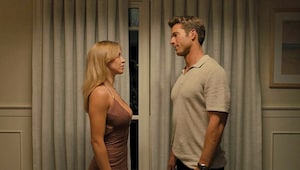
Are we really rejecting people over zodiac signs instead of red flags?

Genius hack or pathway to loneliness? The dawn of dating’s spreadsheet era
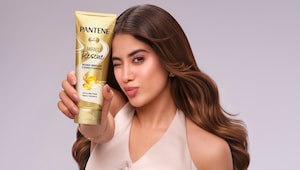
I tried Pantene's Bond Repair Conditioner and here’s what it changed about my styling routine
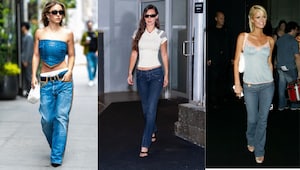
Low-rise jeans are squeezing back into fashion—here’s how to wear them in 2026

I travel for a living—these are the top 15 tips I've learned to avoid skin freak-outs and overweight luggage

All the hottest beauty finds that make us sit up and take notice

Will we ever stop hating it when women propose to men?
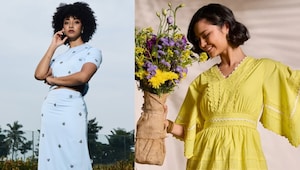
Breezy summer outfits that keep you cool and effortlessly chic
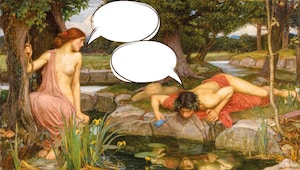
Is Gen Z going analogue amid an epidemic of disconnection?
